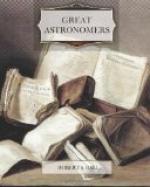There is a very interesting memoir of Hamilton written by De Morgan, in the “Gentleman’s Magazine” for 1866, in which he produces an excellent sketch of his friend, illustrated by personal reminiscences and anecdotes. He alludes, among other things, to the picturesque confusion of the papers in his study. There was some sort of order in the mass, discernible however, by Hamilton alone, and any invasion of the domestics, with a view to tidying up, would throw the mathematician as we are informed, into “a good honest thundering passion.”
Hardly any two men, who were both powerful mathematicians, could have been more dissimilar in every other respect than were Hamilton and De Morgan. The highly poetical temperament of Hamilton was remarkably contrasted with the practical realism of De Morgan. Hamilton sends sonnets to his friend, who replies by giving the poet advice about making his will. The metaphysical subtleties, with which Hamilton often filled his sheets, did not seem to have the same attraction for De Morgan that he found in battles about the quantification of the Predicate. De Morgan was exquisitely witty, and though his jokes were always appreciated by his correspondent, yet Hamilton seldom ventured on anything of the same kind in reply; indeed his rare attempts at humour only produced results of the most ponderous description. But never were two scientific correspondents more perfectly in sympathy with each other. Hamilton’s work on Quaternions, his labours in Dynamics, his literary tastes, his metaphysics, and his poetry, were all heartily welcomed by his friend, whose letters in reply invariably evince the kindliest interest in all Hamilton’s concerns. In a similar way De Morgan’s letters to Hamilton always met with a heartfelt response.
Alike for the memory of Hamilton, for the credit of his University, and for the benefit of science, let us hope that a collected edition of his works will ere long appear—a collection which shall show those early achievements in splendid optical theory, those achievements of his more mature powers which made him the Lagrange of his country, and finally those creations of the Quaternion Calculus by which new capabilities have been bestowed on the human intellect.
LE VERRIER.
The name of Le Verrier is one that goes down to fame on account of very different discoveries from those which have given renown to several of the other astronomers whom we have mentioned. We are sometimes apt to identify the idea of an astronomer with that of a man who looks through a telescope at the stars; but the word astronomer has really much wider significance. No man who ever lived has been more entitled to be designated an astronomer than Le Verrier, and yet it is certain that he never made a telescopic discovery of any kind. Indeed, so far as his scientific achievements have been concerned, he might never have looked through a telescope at all.




